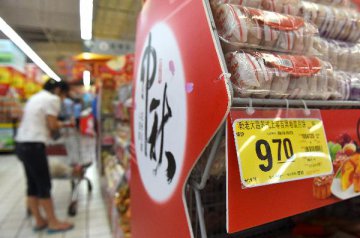
中秋刚过,不知各位吃的什么馅的月饼?
往年被黑的五仁君月饼,今年光荣登上月饼销售前三甲的名单。
作为吃货的小编关心的是什么馅的月饼好吃。
经济学家们就不一样了。
最近《经济学人》杂志发文表示月饼是了解中国经济领域的风向标。
下面同小编一起来看看,经济学家是如何从月饼中看经济的吧。
月饼可谓是最具争议的食物之一了。有人说月饼是中秋节必吃的美味,也有人觉得月饼太干、太腻、卡路里高。
不过,经济学家的角度就完全不一样了,他们觉得月饼是消费、创新、腐败和灰市交易领域的风向标。
MOONCAKES are among the most divisive treats. For some the chewy pastries are delicacies on which to gorge for the Mid-Autumn Festival, a Chinese holiday that falls this year on September 24th. For others they are dry, dense and full of calories. But for economists they are something else entirely: an indicator of important trends in consumption, innovation, corruption and grey-market trading.
月饼之所以能成为风向标,原因就是大家送礼都送月饼啊。
中秋节前,企业给员工发月饼;生意伙伴互赠月饼。
总之中国人很爱月饼了。
除了对月饼的爱,更重要的是月饼是经济状况的晴雨表。
而今年令人振奋的是,即使是中美贸易局势吃紧,中国烘焙协会预计今年月饼销量仍将稳步上升5%。
Mooncakes play this role because of their status as gifts. Ahead of the mid-autumn holiday, companies give them to employees; business contacts exchange them. Consumption of mooncakes is thus less a reflection of whether people enjoy the pastries, likened by some to edible hockey pucks, and more a measure of the health of the economy. So it is heartening to know that, amid rising trade tensions with America, the Chinese bakery association has forecast that sales of mooncakes will rise by a solid 5-10% this year.
一些人担心,中国消费者在债务不断增加的压力下,会选择消费低价商品。
但是消费者们依然比较喜欢高价的各式各样创意月饼而不是传统的蛋黄月饼。
今年香格里拉酒店酒店推出了蓝莓奶酪月饼,收获大批粉丝。哈根达斯门口排着长队买冰激凌月饼。
今年至少有三十多家上市食品公司推出月饼,企图从20亿美元的月饼市场上分一杯羹。
Some observers fret that Chinese consumers, burdened by rising debt, have started opting for cheaper goods. But consumers still plump for more expensive varieties of mooncakes rather than the classic nut-and-egg-yolk fillings. Shangri-La, a five-star hotel chain, has won fans with its blueberry-cheese mooncake (dismissed by traditionalists as cheesecake). Judging by long queues at Häagen-Dazs stores, mooncake-shaped ice-cream sandwiches are also booming. At least 30 listed food companies, more than ever before, are vying for a bite of the $2bn mooncake market this year.
月饼一直都透着一丝腐败的气息。企业要想讨好官员,就会送上精致装饰的月饼。
2013年以来,中国开始冲拳打击腐败现象,月饼市场萎缩了20%。
近三年来,月饼市场才开始慢慢恢复。
Mooncakes have long given off a whiff of corruption. Businesses seeking favours from officials send lavishly wrapped boxes of them. When Xi Jinping, China’s powerful president, intensified his anti-graft campaign in 2013, the mooncake market shrank by more than 20%. A rebound over the past three years has naturally fuelled talk of a rebound in bribery, too. The government has denied this. Yet it is clearly worried. The front page of the newspaper published by the Communist Party’s anti-graft agency warned on September 17th that although mooncakes are small, they can point to much bigger problems.
所以,也许月饼最大的作用就是可以看中国的灰色经济,
像往年一样,今年上海街头、人多地铁站和一些大型烘焙店门前都有收购月饼礼盒优惠券的黄牛在等客。
问题在于分配效率低:不想要优惠券的人却有大量优惠券。中国有许多这种低效率,国有企业和送礼的传统就是这种低效率的体现。
但是这种情况也有解决措施。
Perhaps the tastiest morsel from mooncakes is what they reveal about China”s grey economy. Scalpers hawking mooncake gift coupons have taken to Shanghai’s streets in recent days, as they do every year, standing outside busy subway stations and popular bakeries. Most economic studies describe scalping as a phenomenon that arises when scarce tickets to sporting events or concerts are resold at a hefty markup. Yet there is no shortage of mooncakes in China. The problem is inefficient allocation: too many coupons are given to people who do not like them. China’s economy has plenty of inefficiencies, whether in the form of state-owned companies or gift-giving customs. But it sometimes also has solutions.
来源:经济学人,译者:Coral Zhong





















最新评论